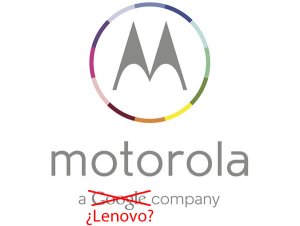 NEWS
NEWS
 NEWS
NEWS
 NEWS
NEWS
![]() The tech world was taken by surprise last night when Google announced the sale of Motorola, the smartphone maker it acquired just two years ago for $12.5 billion, to China’s Lenovo in a cut-price $2.91 billion deal. The sale was first reported by the New York Times before being confirmed by Google’s Larry Page in a blog post shortly thereafter. It’s said that the deal is for Motorola’s handset business only, and that Google will keep most of the company’s patents.
The tech world was taken by surprise last night when Google announced the sale of Motorola, the smartphone maker it acquired just two years ago for $12.5 billion, to China’s Lenovo in a cut-price $2.91 billion deal. The sale was first reported by the New York Times before being confirmed by Google’s Larry Page in a blog post shortly thereafter. It’s said that the deal is for Motorola’s handset business only, and that Google will keep most of the company’s patents.
At first glance it looks as if Google has taken a massive loss on the deal, but that’s not the full picture. As Forbes reports, when Google first acquired Motorola, it also got its hands on the company’s $3.2 billion cash pile, plus an additional $2.4 billion in deferred tax assets, resulting in a net acquisition cost of just $6.9 billion. Add on the $2.3 billion sale of Motorola’s set top box business to Arris Group, plus the $75 million it received from the sale of Motorola’s factories to Flextronics, and that further reduces Google’s cost to just $3.85 billion.
With the sale of Motorola to Lenovo, that means Google spent under a billion dollars for a bunch of patents it previously valued at $5.5 billion – not such a bad deal when you look at it that way.
Despite the savings, it’s fair to say that Motorola’s patents benefited Google less than the company had anticipated. At the time of the acquisition, Google said that the patents would “increase competition by strengthening Google’s patent portfolio [and] enable us to better protect Android from anti-competitive threats from Microsoft, Apple and other companies,” but that just hasn’t happened. Rather, Google has faced increased scrutiny from regulators and a number of courtroom defeats, including being found to be in breach of obligations to license its patents according to FRAND (fair, reasonable and nondiscriminatory) terms.
Google did win a handful of court cases, but this brought in very little reward. In one case where Motorola emerged victorious against Microsoft, the judge awarded it a measly $1.7 million in annual royalties rather than the $4 billion it wanted.
As for actually selling phones (Motorola’s main business), the company hasn’t sold too many of them either. Since Google took over the company, it’s come up with a few decent handsets like the Moto X and the Moto G, but that wasn’t enough to regain footing in the Android handset markets. Indeed, in its most recent quarter, the firm suffered a loss of some $248 million, which was far greater than the same quarter in the previous year.
For these reasons, it’s hard to see Google’s acquisition of Motorola as a success – certainly, it never really “supercharged the Android ecosystem” as Google had hoped.
As far as Lenovo is concerned, the deal is an interesting one. The Chinese company has had mixed success in the mobile arena to date – it has done very well on its home turf, but its phones are largely unheard of in markets like North America and Europe. The company has long been linked with the acquisition of an established smartphone brand – notably BlackBerry – to help bolster its efforts in these markets, so it will be interesting to see what it does with Lenovo.
Speaking to the Wall Street Journal last night, Lenovo Chairman and CEO Yang Yuanquing said that the company plans to keep the Motorola brand alive, alongside its own portfolio of tablets and phones. In addition, Yang confidently predicted sales of 100 million handsets this year after it completes the Motorola deal. Yang added that Lenovo “can further grow the business, not just in the US and Latin America, where [the Motorola brand] is strong today.
Yang’s comments were echoed by Motorola’s CEO Dennis Woodside, who said that the deal will “combine two challenger brands” and will ultimately see them become “a true force in mobility.”
That of course, will only happen if and when the deal is completed. It should be noted that Larry Page said, “The deal has yet to be approved in the US or China, and this usually takes time.” Although Lenovo isn’t nearly as controversial a company as, say, Huawei, there is a risk that the deal could hit a stumbling block. Don’t forget that Motorola is involved in the very sensitive business of telecommunications, and American regulators are easily spooked by the involvement of Chinese companies in this field.
It is said that Lenovo’s bid for BlackBerry was derailed by the Canadian government, mainly because of the fact that it places a lot of trust in that company’s enterprise security, so expect a contentious review period for this deal too.
Support our mission to keep content open and free by engaging with theCUBE community. Join theCUBE’s Alumni Trust Network, where technology leaders connect, share intelligence and create opportunities.
Founded by tech visionaries John Furrier and Dave Vellante, SiliconANGLE Media has built a dynamic ecosystem of industry-leading digital media brands that reach 15+ million elite tech professionals. Our new proprietary theCUBE AI Video Cloud is breaking ground in audience interaction, leveraging theCUBEai.com neural network to help technology companies make data-driven decisions and stay at the forefront of industry conversations.